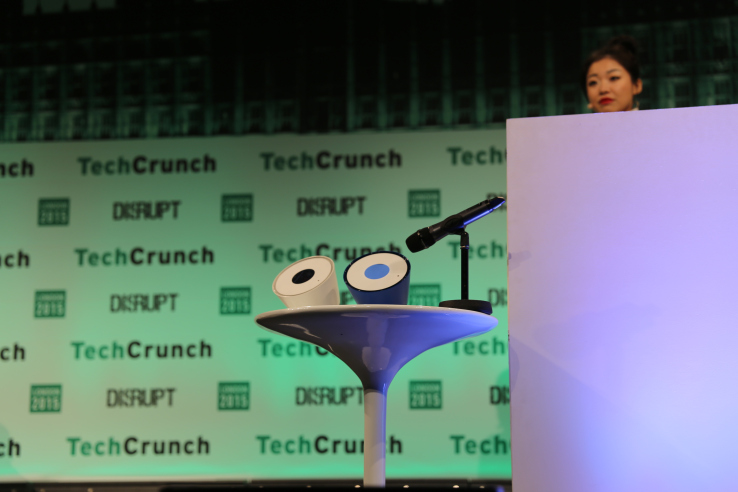

UK robotics startup and TechCrunch Disrupt London 2015 battlefield alum Emotech has closed more than $10 million in Series A funding to continue working on its prototype robot assistant. It’s building a personality adapting AI-powered robot called Olly.
The team intended to demo their robot on stage at TC Disrupt last December (pictured above) but had some technical difficulties with the early prototype. They say they’re now focusing on a big push for CES 2017 to show off a more polished device in January — and that’s what the funding is being used for.
The investment comes from two Chinese VC firms: Alliance Capital and lead investor Lightning Capital, the latter a new VC firm focused on AI and health tech and based in Shanghai, according to Emotech.
In terms of launch timeframe for Olly, they’re slating “early next year” — with an English version of the bot set to come first.
Emotech is aiming to create a virtual assistant robot with more varied personality than existing voice controlled assistants, such as Amazon’s Echo or Apple’s Siri. The robot’s flagship feature is slated as the ability to adapt to the personality of its owner — with the claim that no two Ollys will be the same because they will adapt to reflect the personality of their owners.
The team originally intended to take a crowdfunding route to raise capital for continued development of Olly. But after meeting their investors, via a friend’s introduction, co-founder Chelsea Chen says they decided to postpone the crowdfunding until next year — and use a campaign then for product testing and community building, rather than to fund development of the prototype.
Another robot assistant startup that’s further down the road than Emotech, US-based Jibo, raised more than $3.7M via an Indiegogo crowdfunding campaign last fall — before going on to rake in $25.3M in Series A funding (followed by an $11M extension to focus on Asia).
However Jibo has failed to ship its robot within its original estimated timeframe, of March/April — noting the delays in an update to its crowdfunding backers three months ago. Last we heard, Jibo was slating an October 2016 timeframe for shipping.
Safe to say, hardware is always hard. And ambitious AI-powered robot assistants are clearly harder to deliver than the average chunk of electronics — given the high performance bar required to satisfy demanding consumer expectations for connected utility — even, evidently, when you have a lot of cash at your disposal, as Jibo does.
It remains to be seen whether Olly’s makers will be able to stick to their launch schedule. Expecting delays is prudent.
Chen says most of the new funding will be used for hiring AI expertise to build out its team on that crucial front. They’re also aiming to collaborate with university labs, with Chen adding they have been working with Imperial College, Edinburgh University, UCL, Berkley and Princeton.

